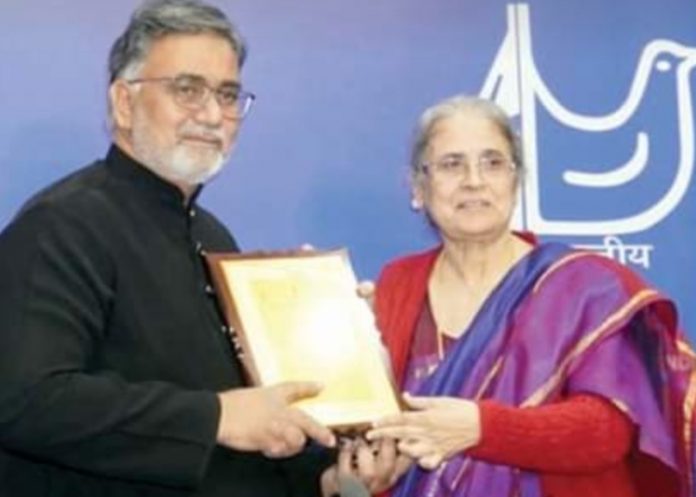Hyderabad, TELANGANA:

New Delhi:
Noted journalist and editor of Urdu weekly “Gawah” from Hyderabad, Dr. Syed Fazil Hussain Parvez became the first Urdu journalist to win the prestigious National Award for Excellence in Journalism from the Press Council of India. He was honoured with the award at a ceremony held in the Constitution Club on February 26.
After receiving the award, he said he was humbled by this award and its reward for his hard work. Urdu journalism in India has a brighter future, but it depends on the sincerity and work of Urdu journalists, he added.
Dr. Parvez is a well-known journalist from Hyderabad, Telangana, who has achieved recognition internationally. He is the Chief Editor, Publisher, and Proprietor of “GAWAH Urdu Weekly,” the oldest and most prestigious Urdu News Tabloid in South India, as well as the Managing Partner of “Media Plus,” a renowned communications and public relations firm with a global clientele based in Hyderabad, India. He holds a Doctor of Philosophy (Ph.D.) in journalism, and a Telangana University research scholar is currently working on a Ph.D. on his contributions to Urdu journalism and media.
On receiving the award, he was felicitated at Institute of Objective Studies here on March 2 and a discussion on the future of Urdu journalism was also held. Lauding his contributions to Urdu journalism, speakers hoped that the young Urdu journalists would emulate Dr Parvez in their profession. Veteran journalist Anjum Naeem said that Dr. Parvez was the first Urdu journalist who was honoured with the award.
President of the Urdu Media Association, Dr. Muzaffar Husain Ghazali, said that Dr. Pavez re-produced the writings of unknown journalists and introduced them through his newspaper. That was the reason why he was chosen for the PCI’s national award for excellence in journalism. He was the first Urdu journalist to receive the prestigious award.
Ahmed Javed, a senior journalist, noted that Dr. Parvez was one of the journalists who rose from the ranks to the top. The aforementioned award, according to him, was established in 2015 to honor Rajaram Mohan Roy, a notable social reformer. Nobody could survive without effort, so struggle was the natural order of things. He pointed out that the media was a business venture that needed significant upfront investment and a healthy market. It is important to conduct a case study on Syed Fazil Husain. There were many obstacles in today’s world, but there were always people like Fazil Husain to meet them.
Senior journalist Suhail Anjum, Shafi Ayub, DrAzeem Akhtar, Abrar Rahmani and others also spoke on the occasion.
In his address, Dr. Parvez said that if the future of Urdu journalism was not very bright, he noted, it was also not completely hopeless. Every party needed the media to connect with voters. He requested the Urdu journalists to inform the owners of the newspapers that they did not control their destiny. He offered a suggestion for a corpus to help journalists as his final point.
In the light of the experiences of his practical life, he could safely conclude that the opportunities in Urdu and its journalism had also increased. Urdu newspapers published from Hyderabad were a link between non-resident Indians and the country and its society. NRI boys were seeking the help of Urdu newspapers for matrimonial alliance with Indian girls. NRIs subscribed to Urdu newspapers in their homes as a good omen and accessed them on websites. He opined out that a journalist has to grapple with odd situations. If it were not true then the owners of the widely circulated Hindi daily, Jagran would not have purchased the leading Urdu newspaper, the Roznama Inquilab. Referring to the artificial intelligence, he said that one could easily access a 500-page article from the website within no time. Every institution needed a spokesperson to reach out to the people, he said.
He said that journalism is being taught in madrasas in Hyderabad. The madrasa managed by Maulana Khalid Saifullah Rahmani, general secretary of the All India Muslim Personal Law Board, was performing admirably in this regard.
Dr Parvez interviewed five Prime Ministers of India including Rajiv Gandhi, V.P.Singh, H.D.Deve Gowda, Inder Kumar Gujral and Dr Manmohan Singh and President of India APJ Abdul Kalam. He also interviewed prominent personalities including many sportsmen, and diplomats and visited several countries including USA and UK.
source: http://www.muslimmirror.com / Muslim Mirror / Home> Indian Muslim> Media> Positive Story / by Abuazeem / March 02nd, 2023








